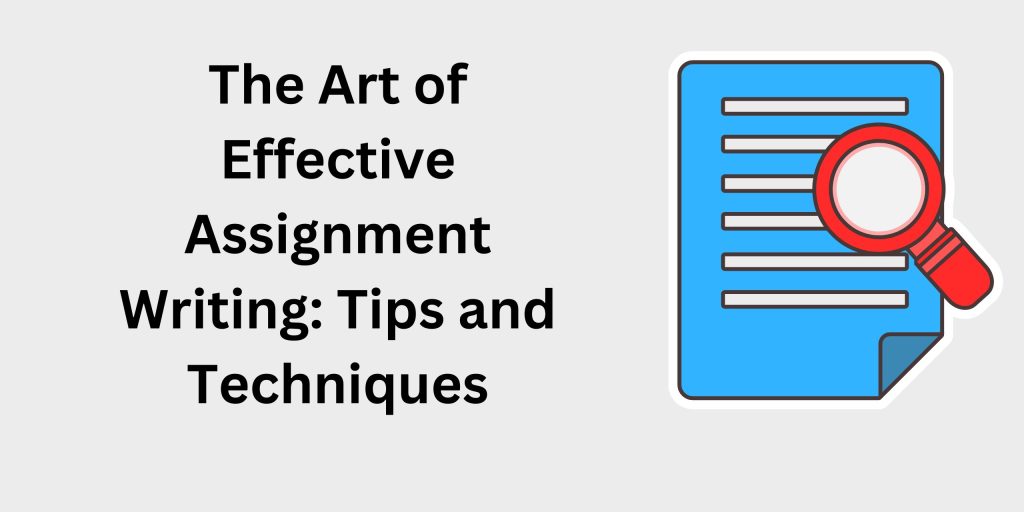Writing assignments can be a daunting task for many students. Whether you are in high school or pursuing higher education, the ability to effectively communicate your ideas through writing is essential. In this blog post, we will explore some tips and techniques that can help you master the art of assignment writing and improve your overall academic performance.
- Understand the Assignment Prompt: Before you start writing, it is crucial to thoroughly understand the assignment prompt. Read it carefully and make sure you grasp the requirements, such as the topic, word count, formatting style, and any specific instructions provided by your instructor. If you have any doubts, seek clarification to ensure you are on the right track.
- Plan Your Time: Time management plays a crucial role in assignment writing. Break down the task into smaller, manageable parts and create a timeline for each stage of the writing process, including research, outlining, drafting, revising, and editing. Set realistic deadlines for yourself and stick to them to avoid last-minute rushes and unnecessary stress.
- Conduct In-Depth Research: Solid research forms the foundation of a well-written assignment. Take the time to explore various sources of information, such as textbooks, scholarly articles, reputable websites, and academic databases. Collect relevant data and supporting evidence to strengthen your arguments. Remember to cite your sources accurately using the appropriate citation style, such as MLA, APA, or Chicago.
- Create an Outline: An outline serves as a roadmap for your assignment. It helps you organize your thoughts, structure your ideas, and maintain a logical flow throughout your writing. Start by outlining the main sections and subsections of your assignment. Include a clear introduction, body paragraphs that support your thesis statement, and a concise conclusion. Bullet points or short phrases can be used to highlight key points within each section.
- Develop a Strong Thesis Statement: A thesis statement is the central idea or argument of your assignment. It should be clear, concise, and specific. Take the time to craft a strong thesis statement that effectively conveys the purpose and direction of your writing. Ensure that each paragraph in your assignment contributes to and supports your thesis statement.
- Use Clear and Concise Language: Effective communication is all about clarity. Use simple and concise language to convey your ideas. Avoid unnecessary jargon or complex sentence structures that may confuse your readers. Each sentence should have a clear purpose and contribute to the overall coherence of your writing.
- Support Your Arguments with Evidence: Whenever you make a claim or present an argument, support it with evidence. This could include facts, statistics, examples, or expert opinions. By providing supporting evidence, you strengthen the credibility of your arguments and demonstrate a thorough understanding of the topic.
- Maintain Proper Formatting and Citations: Adhering to the prescribed formatting style is essential in assignment writing. Follow the guidelines provided by your instructor regarding font size, spacing, margins, and headings. Additionally, ensure that you accurately cite all the sources you have used in your assignment. Improper citations can lead to plagiarism, which can have serious consequences for your academic career.
- Revise and Edit: Once you have completed the initial draft, take the time to revise and edit your assignment. Read through it carefully, checking for grammatical errors, sentence structure, clarity, and coherence. Pay attention to the overall organization and flow of your writing. Consider seeking feedback from peers, tutors, or professors to gain a fresh perspective on your work.
- Proofread for Errors: Before submitting your assignment, make sure to proofread it for any spelling or typographical errors. Use spell-check tools, but don’t solely rely on them. Take the time to read your work aloud or ask someone else to proofread it for you. Sometimes, a fresh pair of eyes can catch mistakes that you might have overlooked.
In conclusion, effective assignment writing requires careful planning, thorough research, clear communication, and meticulous editing. By following these tips and techniques, you can enhance your writing skills and produce assignments that are well-structured, coherent, and compelling. Remember, practice makes perfect, so keep writing and honing your skills. Good luck!
